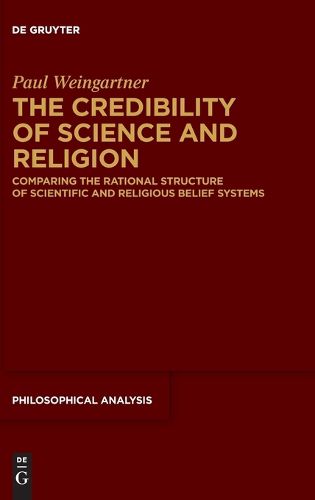Readings Newsletter
Become a Readings Member to make your shopping experience even easier.
Sign in or sign up for free!
You’re not far away from qualifying for FREE standard shipping within Australia
You’ve qualified for FREE standard shipping within Australia
The cart is loading…






Weingartner compares criteria and basic assumptions for the credibility of scientific and religious belief systems. It is shown that mankind has access to basic knowledge about a higher spiritual power and knowledge by conscience about what is obligatory or forbidden. This is defended by further axiomatizations on basic terms as natural goods, natural and moral law, and conscience. Scientific and religious belief systems are then compared thoroughly and by logical deduction and verisimilitude. One main argument is that every kind of belief system has an upper and a lower bound of credibility, yet a degree of credibility that leads to the impossibility of rational justification for scientific belief systems must not be required from religious belief systems. Further topics are internal and external consistency, local refutation, mutual complementation between religion and theory of evolution as well as a comparison of the five world religions leading to general features of religion. It is shown that one main yet basic axiom of morality is the principle of charity. Finally, the book concludes with the credibility-requirements of science towards religion and those of religion towards science.
$9.00 standard shipping within Australia
FREE standard shipping within Australia for orders over $100.00
Express & International shipping calculated at checkout
Weingartner compares criteria and basic assumptions for the credibility of scientific and religious belief systems. It is shown that mankind has access to basic knowledge about a higher spiritual power and knowledge by conscience about what is obligatory or forbidden. This is defended by further axiomatizations on basic terms as natural goods, natural and moral law, and conscience. Scientific and religious belief systems are then compared thoroughly and by logical deduction and verisimilitude. One main argument is that every kind of belief system has an upper and a lower bound of credibility, yet a degree of credibility that leads to the impossibility of rational justification for scientific belief systems must not be required from religious belief systems. Further topics are internal and external consistency, local refutation, mutual complementation between religion and theory of evolution as well as a comparison of the five world religions leading to general features of religion. It is shown that one main yet basic axiom of morality is the principle of charity. Finally, the book concludes with the credibility-requirements of science towards religion and those of religion towards science.